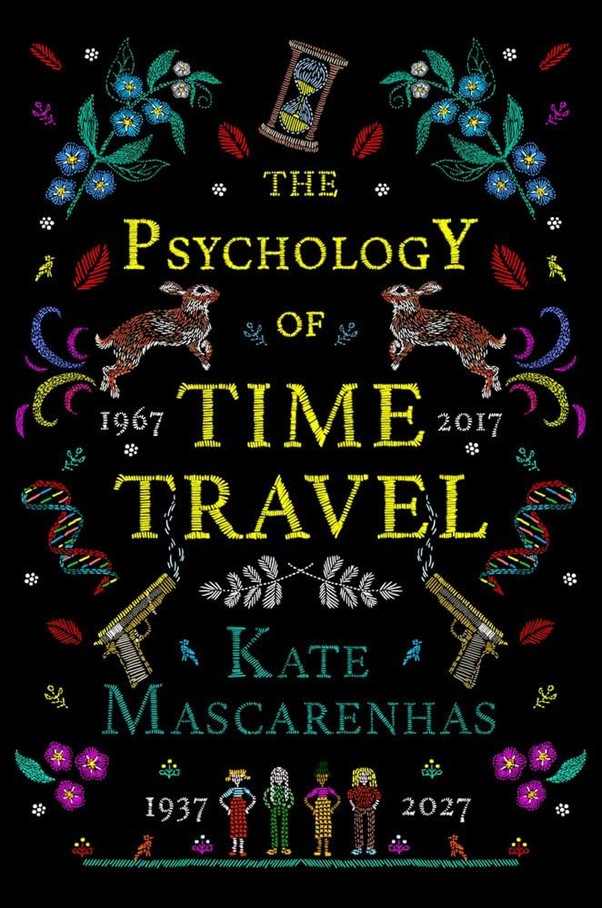“Time is not a linear construct, but rather a deeply interconnected web of moments.”
Considering the field of science-fiction often dictated by cis-hetero white men, you can imagine how ecstatic I was to find an SF novel with queer women in the forefront. Especially when it was one of my favourite SF themes—wibbly wobbly timey-wimey stuff.
Synopsis
The Psychology of Time Travel is the 2018 debut novel for British writer Kate Mascarenhas. It follows the creation of time-travel by four brilliant female scientists in the year 1967. Just as they reveal their invention to the public, one of the time-travelling pioneers, Barbara, experiences a mental breakdown during a live TV interview. Embarrassed, humiliated and shamed, the scientists permanently exile her from the project without so much as a penny or a goodbye before they erase her contributions from history entirely. But who could predict that such an action could trigger so much chaos even decades later?
In 2017 Ruby, the granddaughter of the disgraced scientist, wants to know the full extent of her grandmother’s time-travelling past. But no one wants to talk about it. At least not until they receive a message from the future that warns them of an elderly woman’s violent death. Suddenly propelled into a world that her mother and grandmother tried so hard to steer her clear of, Ruby begins to wonder if it was her destiny to be involved in time-travel.
Meanwhile in 2018, Odette goes into work one day and finds a dead woman in the locked basement with a bullet in her head. Now Odette can’t seem to get the woman out of her mind. Who was she? How was she killed in a room locked from the inside? And why is everyone trying to cover up the murder? By following the alternating voices of Barbara, Ruby, Odette and other characters across time, readers gradually uncover the connections between these outwardly disjointed, unclear and unusual events.
This speculative novel will leave you existentially questioning time itself and with murder, lesbian sex across eras, and glass-ceiling shattering female scientists creating time-travel, what else could you want from a novel?
“The power to manipulate time brings both great responsibility and great temptation.”
Genre-Bending
Mascarenhas’ book spans across several genres and is queer-positive masterpiece. This book is part science fiction, part queer romance and part crime thriller—it explores a locked-room mystery like the work of Agatha Christie while also analysing the alternate history we would experience if, like in H.G. Wells’ classic novel The Time Machine, humans had access to time-travel technology.
The Minority and Diversity Report
Though it does not set out to break barriers, The Psychology of Time Travel realistically and authentically represents voices from various minorities. Mascarenhas has created three-dimensional characters who are queer, mixed race or disabled without being tokens.
You will fall in love with every character—and there are a lot of them—while simultaneously scrutinising each one as you wonder if they are truly capable of murder. You will want nothing else but to both become a time-traveller and never come across time-travel ever in your life. And like me, you will read the book within days.
Can’t Get You Out of My Head
“Time travel allows us to confront our regrets and reshape our destinies.”
Mascarenhas inventively explores the possible mental and psychological side-effects of time-travel. She interprets the devastating trauma and the realities as well as the significant impacts that therapy and a solid support system can positively affect people—even when the cause of such problems is fictional.
Understandably she truly understands the depths of the human mind as she was originally a trained psychologist. Though Mascarenhas chose to return to writing at 32 after being diagnosed with bipolar disorder. Before knowing she has her own experiences of mental health, I could tell that she truly understood her characters’ various mental illnesses – the characters’ traumas are not glossed over, nor overly embellished that it could trigger the reader. Mascarenhas treads judiciously and the result is phenomenal. As someone who lives with mental health problems, I greatly admire the realistic portrayal and the recognition. I truly appreciate the immensely positive responses that this novel has been given as it means Mascarenhas’ voice, as someone who has and writes about mental illnesses, is truly being heard.
Final Thoughts
The Psychology of Time Travel is a unique, inventive and captivating entry to the contemporary science-fiction genre. It has no true equal in crime or science fiction. It will feel like nothing you’ve ever read before while also filling a void you never knew existed. Such a beautifully-written novel that will both trouble your mind and send it racing with creative ideas. Fans of time-travel fiction—whether that’s H.G. Wells’ classic The Time Machine or the chick lit romance novel The Time Traveller’s Wife—will adore this novel for years to come. Full of seemingly minute but truly incredible and significant details, slow-burn romances and endearingly realistic characters, this book undoubtedly belongs on every sci-fi fan’s bookshelf.
“Life’s better with a few risks than a lot of regrets.”
Have you read this book?
We would love to hear your thoughts on this book, perhaps you agree with our review, or, disagree?





